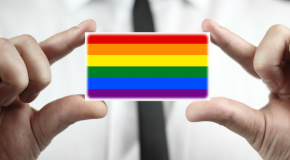Watch Michael Gold, wirter of Pride and prejudice: The future of advocacy sharing insights about companies' role in LGBT advocacy at The Economist's annual Pride and Prejudice event.
Pride and prejudice: The future of advocacy - highlight video
Michael is a managing editor at Economist Impact. Although Michael has roots in Montreal, he grew up in Palo Alto, California and attended Yale University, where he majored in anthropology. Prior to joining the Economist Group, Michael was a correspondent for Reuters in Taipei, where he covered the technology sector. He has also worked in Beijing and is fluent in Mandarin.
Related content

Pride and prejudice: The future of advocacy
This report, the third in an annual series of Economist Intelligence Unit studies addressing the business and economic case for global LGBT diversity and inclusion (D&I), assesses the future prospects for corporate advocacy in the LGBT space, given the perils that face proponents of the liberal, open-minded worldview that underpins LGBT equality. Based on a survey of over 1,000 business leaders worldwide, it finds that although some companies still prioritise LGBT advocacy, the recent rapid social progress in LGBT acceptance that is both cause and effect of this advocacy should not be taken for granted. The key findings are:
Nearly half of respondents believe companies will become more prominent as agents of progress for LGBT rights in future; however, only a third say their own companies will devote more resources to LGBT advocacy, compared with today Although companies with established public positions on LGBT rights are not likely to reverse course, companies that remain “in the shadows” on this issue are likely to stay there Future expectations for various types of advocacy activities are concentrated in North America and Europe, while other regions, where LGBT rights are less entrenched, lag Companies that engage in pro-LGBT advocacy perform better on various measures of business competitiveness compared with their peers, based on self-reported factors Though LGBT issues continue to play a role in political outcomes around the world, few believe the public will demand more progress on this issue versus other rights debates like gender and race and ethnicityRead the report | Watch highlight video | More about Pride and Prejudice

Here today, gone tomorrow
When it comes to advocacy, companies have a choice to make. They can subscribe to economist Milton Friedman’s view that “the social responsibility of business is to increase its profits”, and that using corporate resources to advocate for social causes is not appropriate. Alternatively, they can recognise that companies are merely facets of society, comprised of people who must live and thrive in the same human-rights battlegrounds as activists, journalists and politicians.
Many companies have already acknowledged this fact, and have joined in the movement to create a society that will enable them to succeed. Nowhere is this more apparent than in the global struggle to advance the rights of lesbian, gay, bisexual and transgender (LGBT) people. Recent political developments—the election of Donald Trump as US president foremost among them—have cast doubt over the dramatic progress made in LGBT rights. Corporate executives are beginning to wake up to this fact: 57% of executives in this year’s iteration of The Economist Intelligence Unit’s annual Pride and Prejudice survey agree that “if left unchallenged, the current global political climate could undo progress made in LGBT inclusion.” Respondents in North America, where the election of Mr Trump shocked many in the business community, perceive this trend particularly acutely.
Yet amid the conflicts over race, religion, gender, ethnicity and nationality that flood newspaper headlines on a near-daily basis, many fear LGBT rights will be overshadowed. Our executive panel suggests these worries may be justified: only 6% believe LGBT rights are being most negatively impacted by the current global political climate. Only 5% selected LGBT rights as the area in which the public will demand the most change this year.
It is precisely for this reason that LGBT-friendly companies cannot afford to grow complacent in the belief that society will continue to progress in a favourable direction. Among executives that believe companies will become more prominent as agents of progress for LGBT rights in three years’ time, the majority cited “increasingly positive attitudes toward LGBT people in society” as the main reason for this shift. Yet this rose-tinted future is hardly guaranteed—research released in January by GLAAD, a non-governmental organisation, showed public tolerance of LGBT people in the US decreasing for the first time in four years. Meanwhile, the Trump administration has launched fresh assaults on transgender rights, and persecution against LGBT people overall has risen to alarming levels in other places, from Indonesia to Chechnya.
Companies can and should speak out. Advocacy can take various forms, from advertising campaigns depicting LGBT people to donations to local LGBT-rights organisations. Exercising influence via business networks is also a promising tactic. Hong Kong’s LGBT+ Interbank Forum, for example, brings together a multitude of voices in pushing policies with the local government, which has not proven particularly receptive to LGBT causes. Groups like these can also facilitate knowledge transfer between companies with established track records on LGBT rights and their peers that are just starting out on their advocacy journeys.
This is particularly crucial given that companies that do not consider themselves role models for LGBT diversity and inclusion also generally do not expect the environment for advocacy to get more amenable, according to our survey. In other words, companies that are currently “in the shadows” on this issue expect to stay there in future. This places all the more onus on the shoulders of advocacy champions to take the lead in educating the overall corporate ecosystem about the importance of pushing LGBT-friendly practices and policies.
There is much they can teach: the survey suggests companies engaging publicly on LGBT rights may outperform their peers on various business competitiveness factors. This is hardly surprising; LGBT inclusiveness within companies has been shown to associate with increased innovation, productivity and stock performance. There is no reason to believe that external LGBT-friendliness would correlate with corporate strength any less so than the internal variety.
Having the confidence to be an advocate is often the natural by-product of an inclusive company culture; many of the strongest LGBT champions hardly consider their advocacy work to be a choice at all, but rather part of their corporate DNA. Yet there is little denying that this kind of open, diverse mindset that underpins LGBT rights is under assault the world over. No company, even the most forward-thinking, can insulate itself from these pressures. Companies indeed have a choice, and it is incumbent on them to play their part in ensuring that the simple desire of people to be able to love who they wish to love, and to identify with the gender they feel rather than that assigned to them, remains protected the world over.
The Economist is a proud champion of liberal values. We argued in favour of same-sex marriage in 1996 and have long been vociferous champions of the LGBT agenda. In 2016 we created Pride and Prejudice, our first 24-hour worldwide event focusing on the significance of LGBT inclusion in all aspects of business and politics. Chaired by senior editors from The Economist, our 2018 gathering will again debate how governments, companies and individuals can become advocates, and help improve the legal rights of LGBT people worldwide.
Visit the Pride and Prejudice website for more information and join the discussion at #EconPride.
The views and opinions expressed in this article are those of the authors and do not necessarily reflect the views of The Economist Intelligence Unit Limited (EIU) or any other member of The Economist Group. The Economist Group (including the EIU) cannot accept any responsibility or liability for reliance by any person on this article or any of the information, opinions or conclusions set out in the article.

Pride and Prejudice: Agents of Change
The report, based on a global survey of over 1,000 executives, posits a framework toward achieving positive change for LGBT employees via three key workplace groups: leadership, young people and women.
Read the report | More about Pride and Prejudice | Watch video 阅读报告:简体中文 | 繁體中文